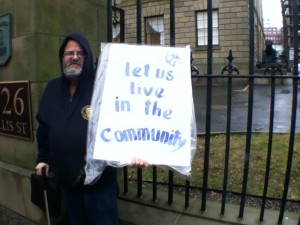Reopening the doors to the ongoing debate
As the introduction of Motion M-312 reopened the abortion debate across the nation, one factor made a difference on both sides of the argument: the internet. Despite the intensity of the ongoing dialogue, there is one thing that both pro-life and pro-choice supporters have in common: they both use online resources for engaging and communicating with other members of the public.
The Motion, which was introduced by Conservative MP Stephen Woodworth in February, called for a government inquiry of the Criminal Code’s definition of human life and when it begins. Once the motion was filed, public responses erupted across multiple platforms online, as Facebook groups, blogs and tweets took shape. The motion was defeated in Parliament on Wednesday by a vote of 203-91, but only after receiving a remarkable amount of public support and opposition on the internet.
This is how Leslee-Ann Martell, a Haligonian and young mother of two, came to be an active participant in the discussion. Martell belongs to a Facebook group called We Need a Law, which represents an organization that runs from the website weneedalaw.ca.
“As a mother of two with a growing family, I want to be confident that the laws in Canada will protect me as well as my unborn children,” said Martell over email correspondence. “I believe that the baby in the womb has rights, and I as a woman and a mother would like to see those rights acknowledged.”
Since she joined the group, Martell actively participated in the dialogue and promotions. Through We Need a Law she discovered a second group, Pass312, which focused entirely on support for Motion M-312. According to the Pass312’s Facebook group, their strategy is “poised to be the most overwhelming pro life mass uprising Canadian Parliament has ever seen.” Martell has shared multiple photos from Pass312 and urged her Facebook friends to join in the political activism.
Inclusiveness in Activism
“Political activism online is a good thing,” says Martell. “It gets people involved in the political process who might otherwise not be. Almost everyone is online these days.”
This idea of being able to reach wider audiences is the same thing online community LeadNow is doing, though for the opposite reasons in this case. The internet-based activist group sent out newsletters, created an online petition, and multiple blog-style posts to the site, urging Canadians to help defeat Motion M-312.
“Canada is a really large country, and using the internet for campaigns facilitates people coming together across the country,” says Maggie Knight, a member of the LeadNow team. “Even if you don’t see people day-to-day who share your political feelings or concerns, you can feel connected to a broader movement, even if you aren’t in the same physical location.”
LeadNow was formed in March 2011, more or less for these specific purposes. The organization’s website says they have seen over 100,000 Canadians join the community, and that they aim to take action on building a more democratic and responsible country. Knight explains that online campaigns seriously effect the dialogue over issues like abortion, because it’s easier for people to learn about and share one another’s beliefs.
“A big part of the discussion has to do with the personal relationships you have,” says Knight. “If you don’t really care about this issue, but it’s important to me, and I’ve forwarded things (online) expressing that it’s important to me, then you’re way more likely to be interested in having that debate. The way we communicate with our community and the way we mobilize on social media follow the same general principle. We try to speak to the values of the whole community.”
Strength in the online campaign
David Chokochvili, a Master’s student at European University in Hungary, titled his thesis paper The Role of the Internet in Democratic Transition: Case Study of the Arab Spring. According to Chokochvili, the internet is the most powerful tool for mobilizing large numbers of people. As he explains in the thesis paper, “Since the late 1990’s, it has been the dominant opinion that the Internet facilitates democracy. Because of its characteristics such as fostering free flow of information and low costs of access, the Net was seen as a tool that would primarily empower citizens and the civil society.”
As Knight explains, LeadNow seeks to take advantage of this and aims to continue the same process.
“A really important long-term goal (for LeadNow) is helping to connect people who are passionate about what happens in their community and country, but haven’t always felt like they’ve had the support and networks to speak up effectively,” she says.
Pass312 made the same promise to continue the debates and the dialogue with the help of the internet. Their most recent Facebook post tells us, “Motion 312 was defeated this afternoon. Do we wish it had passed? Absolutely. Is this a crushing defeat? No, not at all. As we said this morning, so many Canadians are now aware of the sad state of our criminal code. Those of us who know, are now responsible to continue to share that reality with those around us.”



